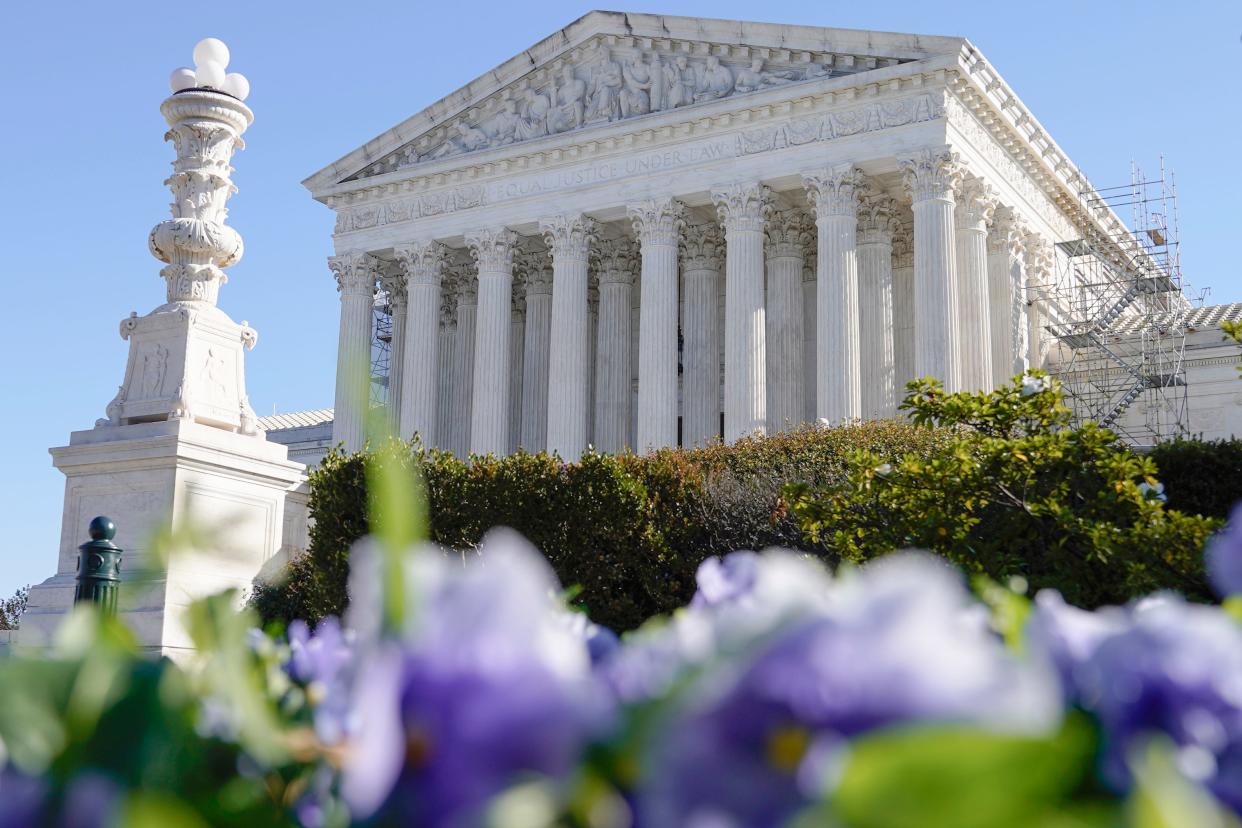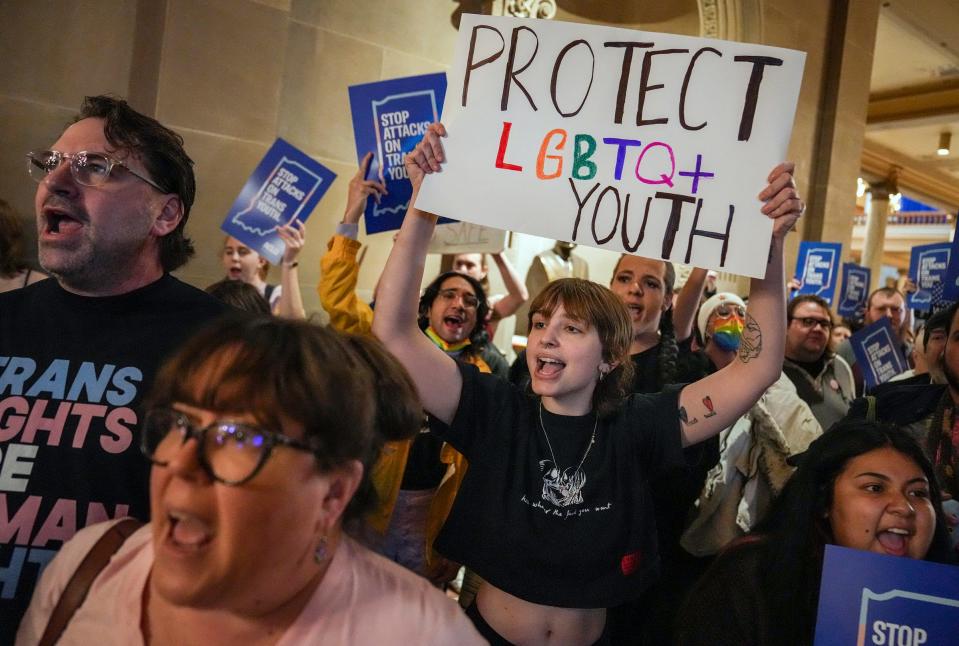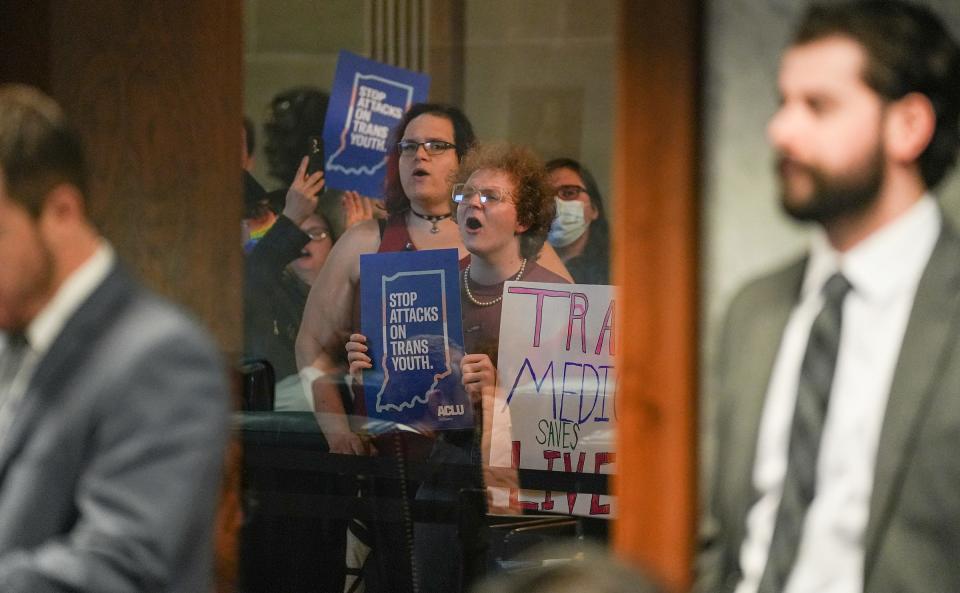Indiana parents asking U.S. Supreme Court to take case involving custody of trans teen

Mary and Jeremy Cox are devout Christians who believe children should be raised based on their sex at birth, and the use of pronouns or names inconsistent with their biological sex is both immoral and harmful.
But the Anderson couple clashed with their teenager, who is a transgender girl. The family's dispute that started with the Indiana Department of Child Services over care of the teen is now the focus of a case that could go before the U.S. Supreme Court.
At issue, according to the Coxes' petition asking the court to take their case, is whether they have the right to raise their children how they see fit — and whether a court order keeping them from talking to their children about their beliefs on sex and gender violates their free speech rights.
The case touches on some of the most controversial issues in Indiana, where conservative lawmakers have passed legislation targeting transgender rights, and LGBTQ+ advocates have turned to the courts to challenge some of those laws. The issue of parental rights has also gained political momentum, particularly among Republicans over the last few years, focusing on issues such as vaccination requirements, school curricula and gender-affirming care for transgender youth.
'I just feel powerless': Trans teens share their stories as new Indiana laws target them
At the heart of the case is the rift between the Coxes and the teenage child over gender identity — and an Indiana court's decision to remove her from her parents' custody partly because of a severe eating disorder that could get worse if she's returned home, where she felt unsafe, according to court records.
"A disagreement between parents and a child is not a reason to remove a child from the home," the Indiana Court of Appeals said in its 2022 ruling that kept in place a Madison County judge's decision to remove the teen, identified in court records as A.C., from her parents' home.
But the appeals court added: "This is an extreme case where Child has reacted to a disagreement with the Parents by developing an eating disorder and self-isolating, which seriously endangers Child's physical, emotional, and mental well-being."
Joshua Hershberger, the Coxes' attorney, said the case challenges the "arbitrary and almost absolute power" that courts have over parental rights.
"Fit parents have the right to raise their children according to their beliefs and best judgment," Hershberger said.

DCS report alleges abuse; parents deny
The Coxes lost custody of their then-16-year-old in 2021, after the Indiana Department of Child Services petitioned a Madison County court, alleging the teen's physical and mental condition was endangered by her parents' actions. DCS had received a report alleging A.C. was thinking of harming herself because of verbal and emotional abuse over her gender identity, according to court records.
An investigation by a case manager found the teen had been suffering from an untreated eating disorder, that her parents had pulled her from school and discontinued her therapy, and that she was thinking of harming herself, according to court records. The case manager's report also found that the teen's mother used vulgar and demeaning language toward her.
The Coxes have denied the allegations.
"The child is a teenager," Hershberger said. "They're having difficult but appropriate conversations with their child."
During a hearing in June 2021, the Coxes presented evidence that they had begun seeing an eating disorder specialist and that they were seeking a new therapist and were in the process of enrolling A.C. in another school.

Still, a county judge ordered that the teen be removed from her parents' custody following a DCS recommendation that she be placed in a home that affirms her gender identity. The judge also cautioned the Coxes not to talk about their religious beliefs on sex and gender during unsupervised weekly visits with A.C.
But by October 2021, A.C.'s eating disorder had gotten worse. She had lost "a significant amount of weight" and was throwing away and hiding food, according to court records. The following month, DCS agreed to dismiss the abuse allegations against the Coxes, and A.C. admitted she had become a danger to herself because of her eating disorder.
The judge, however, decided to keep the teen out of her parents' home after finding that her eating disorder was partly caused by "self-isolation" from her parents, a behavior "likely to reoccur" if she's returned home.
Indiana appeals court: Parents' rights were not violated
Hershberger said the Coxes were "completely surprised" that A.C. was not allowed to return home despite DCS' decision to dismiss the abuse allegations.
They sought to overturn the ruling, but the Indiana Court of Appeals found the Coxes' rights were not violated.
"The Parents have the right to exercise their religious beliefs, but they do not have the right to exercise them in a manner that causes physical or emotional harm to Child," according to the appeals court's decision.
The Indiana State Supreme Court declined to hear an appeal, so the Coxes are turning to the country's highest court for one final plea.
"This case is novel and chilling," according to the Coxes' petition. "The Indiana Court of Appeal's decision, undisturbed by the Indiana Supreme Court, empowers the government to remove children from fit parents without a particularized finding of neglect and abuse."
More rulings: Supreme Court lets stand Washington state 'conversion therapy' ban for LGBTQ+ minors
DCS did not provide medical evidence that A.C. would be more likely to self-harm or her eating disorder would get worse if returned home, according to the petition. The Coxes also argue that their "deeply held religious beliefs and best judgment" on how to raise their child shouldn't be muzzled by the government.
A.C., who has been out of her parents' house for more than two years, is now an adult and can choose to not return home even if the trial court's ruling is reversed. But the Coxes still fear the state may "interfere in their home and in the care and custody of their other (minor) children," according to the petition.
The Indiana Attorney General's Office, which is defending DCS in this case, has asked to have until February to submit a response to the Coxes' petition. The office didn't respond to a request for comment.
The agency's job to defend DCS and the state court rulings would seem to put the AG's office at odds with the personal views of Attorney General Todd Rokita, a socially conservative firebrand who has targeted gender-affirming care by accusing medical clinics that provide such services of child abuse and promising to "robustly defend" a new law that prohibits doctors from performing surgeries and providing medication like puberty blockers to minors.
Case inspired failed Indiana bill
The case was at the center of a bill last session that would have banned courts from removing transgender children from their parents based solely on their refusal to allow gender-affirming care and acknowledge the child's gender identity.
House Bill 1407, authored by Rep. Dale DeVon, R-Granger, was passed by the House but stalled in the Senate. Senate President Pro Tempore Rodric Bray said he had "serious concerns" about the bill and "does not see a path forward" because of the pending court case.
State legislators, though, have passed several new laws affecting LGBTQ+ Hoosiers.
No path forward: Indiana Senate leader kills transgender-related bill targeting DCS
One bans the instruction of "human sexuality" in preschool and third grade and requires schools to notify parents when their child requests to be called by a different name or pronoun, which advocates worry will lead to "outing" trans youth. Another law prohibits doctors from providing gender-affirming care to minors.
The American Civil Liberties Union of Indiana has pending lawsuits to block both bills from taking effect.
Hershberger said he hopes the Supreme Court will decide by April on whether or not to take the case. The high court hears less than 1% of the roughly 10,000 petitions it receives every year.
Those pending petitions include another case from Indiana involving a transgender male student who sued Martinsville school officials after they rejected his request to use the boys' restrooms. A federal appeals court sided with the student, and the Metropolitan School District of Martinsville has asked the Supreme Court to intervene.
IndyStar reporter Kayla Dwyer contributed to this story. Contact IndyStar reporter Kristine Phillips at (317) 444-3026 or at kphillips@indystar.com.
This article originally appeared on Indianapolis Star: Parental rights vs. transgender rights in Supreme Court petition

